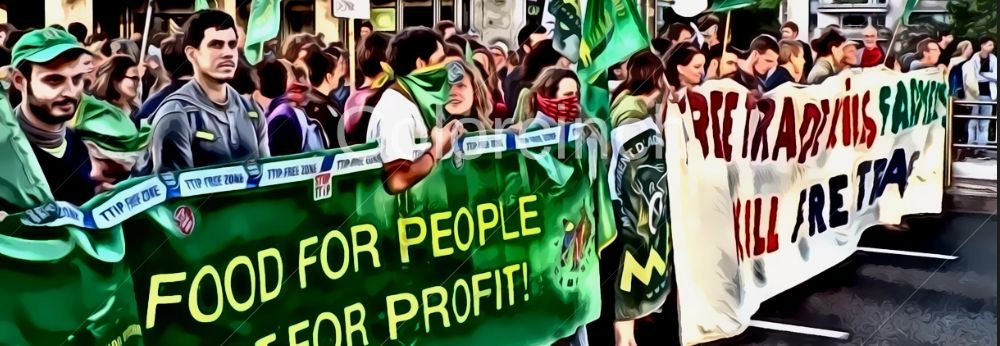Rejection of free trade agreements and the demand for a decent income at the heart of farmers’ mobilizations in Europe
All the versions of this article: [English] [français]
La Via Campesina | 25 January 2024
Rejection of free trade agreements and the demand for a decent income at the heart of farmers’ mobilizations in Europe
- PRESS RELEASE | European Coordination Via Campesina (ECVC)
In Germany, France, Poland, Romania, Belgium and beyond, we are seeing increasing numbers of farmers taking to the streets. Low incomes and a lack of future prospects for the vast majority of farmers is at the root of this discontent, which is largely linked to the neo-liberal policies the European Union has pursued for decades. ECVC is calling for these protests to be taken seriously and for a change in the direction of European agricultural and food policies: it is time to put an end to Free Trade Agreements and resolutely set out on the road to food sovereignty.
Huge numbers of farmers have been taking action across different European countries in recent weeks. Many farmers are struggling under the pressure of neoliberal policies that prevent fair prices. Debt and work overload are skyrocketing, while farm incomes are plummeting.
European farmers need real answers to their problems, not smoke and mirrors. We demand an immediate end to negotiations on the FTA with MERCOSUR countries and a moratorium on all other FTAs currently being negotiated. We demand the effective application of the Unfair Trading Prices (UTP) directive and a ban on selling below production costs at European level, following the example of Spain. Prices paid to farmers must cover production costs and ensure a decent income. Our incomes depend on agricultural prices, and it is unacceptable that these should be subject to financial speculation.
We therefore call for agricultural policies based on market regulation, with prices that cover production costs and public stocks. We call for sufficient budget to allow CAP subsidies to be redistributed to support the transition to an agricultural model capable of meeting the challenges of the climate and biodiversity crises. All farmers who already practice environmentally-friendly farming practices and all those who decide to embark on an agroecological, more sustainable transition process must be supported and accompanied in the long term. It is unacceptable that under the current CAP, a minority of very large farms receive hundreds of thousands of euros in public aid while the majority of European farmers receive little to no aid at all.
ECVC is concerned to see attempts from the far right to exploit and use this anger and the mobilisations to drive its own agenda, including denying climate change, calling for lower environmental standards and blaming migrant workers in rural areas, all of which has nothing to do with farmers’ interests nor improves their future prospects. On the contrary, denying the realities of the climate crisis risks trapping farmers in a succession of increasingly intense disasters, from heatwaves and droughts to floods and storms. We need to take action, and we farmers are ready to make the necessary changes to tackle environmental, climate and food problems but this will not be possible as long as we are forced to produce at low prices in a globalised and deregulated market. Similarly, migrant workers today play a fundamental role both in agricultural production and in the agri-food industry: without these workers, we would be short of labour forces in Europe to produce and process food. The rights of agricultural workers must be fully respected.
ECVC is calling on political decision-makers at European level to act quickly to respond to the anger and concerns of farmers. We need a real change in agricultural policy that puts farmers at the heart of policy-making and gives us prospects for the future. ECVC proposes real solutions to this crisis, described in our Manifesto for agricultural transition in the face of systemic climate crises.






